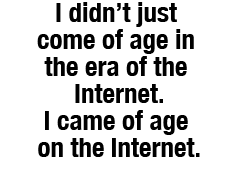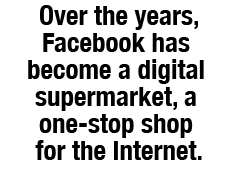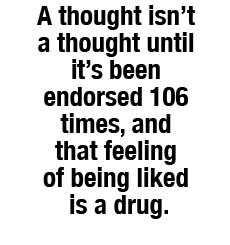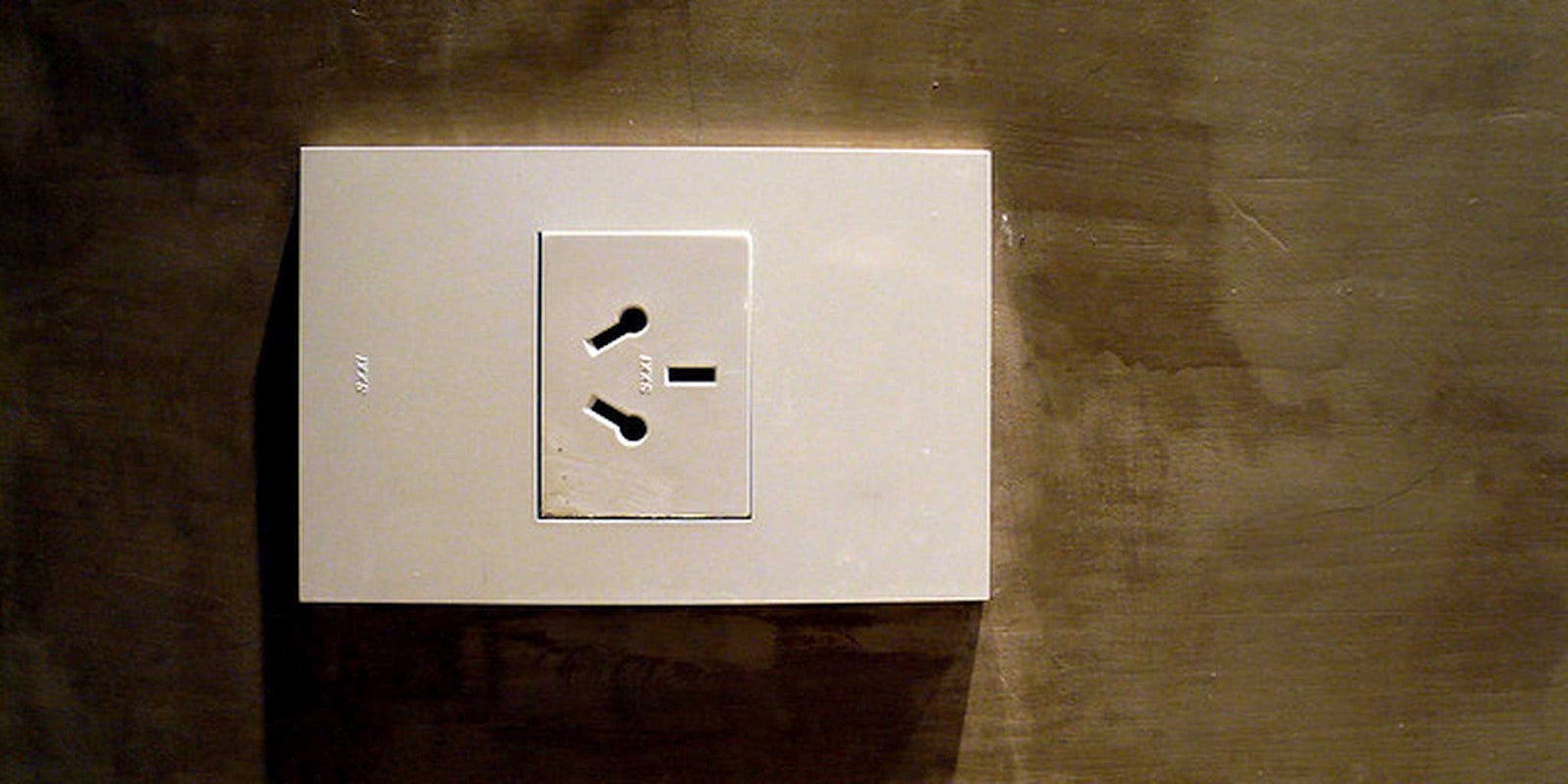One of my earliest memories is of my father’s computer exploding. My father was an early adopter of the PC, a born tech geek who lives to be wired. He was constantly attached to his computer, whether it was untangling MS-DOS programming codes that looked like hieroglyphs or playing a popular game involving dueling gorillas who threw banana bombs at each other while standing on skyscrapers. The trick was to perfectly calculate the velocity and angle of your throw to hit your opponent—or else the city would be destroyed. Nothing less than the fate of the world depended on your ability to manipulate math in order to vanquish your enemies.
My father was obsessed with this game, as well as the myriad possibilities the device offered. To him, IBM’s 1991 model was a window into a new world and a life outside of our small Ohio town, and the hint of freedom was an addiction. He wanted to see into the future so much that almost no one else was allowed near the computer, and he would keep it on all the time. One day, the computer had enough of the future and blew up. In my memories, I remember the bang of glass breaking as the flames rose, but I’m sure that’s not the way it happened. The computer likely went out with a whimper instead, just like it was going to sleep. They say that our memories are the story we tell ourselves, the version of the past we choose to remember, and I like to remember the fire.
 Throughout my life, technology has been a simultaneous force of liberation and destruction. When I was 13, I typed my first short story on our household eMachine, a cheap economy PC that was my mother’s prized possession. The piece was a Memento ripoff about a reclusive mob henchman who has trouble staying awake following a head injury and begins to have supernatural visions. He’s also having marital problems, but don’t worry: His wife was dead the whole time. It was terrible, but it was my terrible story, a small step toward the writer and the person I wanted to be. Whether it was sneaking a peek at gay porn or ferociously updating my poetry Xanga, I didn’t just come of age in the era of the Internet. I came of age on the Internet.
Throughout my life, technology has been a simultaneous force of liberation and destruction. When I was 13, I typed my first short story on our household eMachine, a cheap economy PC that was my mother’s prized possession. The piece was a Memento ripoff about a reclusive mob henchman who has trouble staying awake following a head injury and begins to have supernatural visions. He’s also having marital problems, but don’t worry: His wife was dead the whole time. It was terrible, but it was my terrible story, a small step toward the writer and the person I wanted to be. Whether it was sneaking a peek at gay porn or ferociously updating my poetry Xanga, I didn’t just come of age in the era of the Internet. I came of age on the Internet.
It’s safe to say that I’m addicted to Facebook #facebookaddiction
— Andrew Kimball (@KimballAndrew) January 27, 2014
As a young gay man in the mid-2000s, coming to terms with my sexuality meant finding myself online—exploring what sex and attraction was in chatrooms with guys I’d never meet. The men I chatted with not only taught me the lingo but also gave me the space to be myself—or be other people. Sometimes I enjoyed putting on another person’s identity for the night, coming up with a new identity and figuring out how that person would act or speak or their opinion on an issue might be. Not only was it a vacation from the limits of being myself, but as a young novelist, it also gave me the chance to get into someone else’s head for awhile. I was living as a character of my own creation, whether it was a bored bisexual porn star who happened to major in English at a liberal arts college or a sensitive jock who wanted more out of life than football.
All of my characters were dreamers, looking for their place in the world, and they were more or less versions of me. When I look back, though, it’s hard to remember a moment where my sense of becoming something bigger than myself wasn’t bound up in the Internet or a time where I wasn’t logged on. I would come home from school and instantly plug in, and when I went off to college, I signed up for Facebook right away. It fit nicely with my LiveJournal, AIM, Friendster, MySpace, and three Xanga accounts, all of which I updated regularly. One was for my writing, another was my personal blog and the latter was an old account I couldn’t bear to delete; it was a record of my history, the person I was then. I still kick myself for finally deleting it.
I’ve tweeted 1k times since Tuesday evening… I might have a problem #twitteraddiction
— Ryan Malecha™ (@RyanMalecha) January 24, 2014
I met my first boyfriend on MySpace and my second boyfriend on MySpace, and almost every single guy in college I met because I was constantly connected to Facebook. Existing primarily online was a low-stakes way to be myself—because no matter who you thought you were, it could always be changed. You could alter the bands you liked to be a slightly different person or change your profile picture to send a different type of message to the world. On Facebook, you were a brand that needed to be managed, which took time, effort, and Machiavellian levels of calculation. When you’re looking for friends at a new college in a new city, this is the most important thing in the entire world.
In one way or another, I’d been obsessed with technology since I was a kid—whether it was our Super Nintendo or my uncle’s first generation palm pilot, when holding a computer in your hands still felt like magic—but I’d never met anything like Facebook. Over the years, Facebook has become a digital supermarket, a one-stop shop for the Internet that integrates almost every form of social media you could want. Facebook has an email function that allows you to upload attachments; its own Twitter feed, complete with hashtagging; a chat apparatus that made AIM irrelevant; and even a video chat, for those who want to Skype and status at the same time. It’s been so dominant in the media sphere because it ensures you need nothing else to function online. Facebook is the Internet.
 And Facebook became my life, as I increasingly grew into an addict. Statistics estimate that Facebook’s 1.2 billion active users spend around 40 minutes a day on the site—browsing pictures of cats and masturbating to their exes. However, I was spending at least three hours a day logged on, sometimes as soon as I woke up. (To do this, just sleep with your phone next to you.) When I started writing for a living, I would spend the entire day with Facebook open in another browser, just in case I wanted to see what was happening in the world—or the world according to my friends. If I was away from my computer, I kept the app running on my phone, for if I had something of world importance that I needed to update (e.g. that I find guys with beards sexy). In 2014, a thought isn’t a thought until it’s been endorsed 106 times, and that feeling of being liked is a drug.
And Facebook became my life, as I increasingly grew into an addict. Statistics estimate that Facebook’s 1.2 billion active users spend around 40 minutes a day on the site—browsing pictures of cats and masturbating to their exes. However, I was spending at least three hours a day logged on, sometimes as soon as I woke up. (To do this, just sleep with your phone next to you.) When I started writing for a living, I would spend the entire day with Facebook open in another browser, just in case I wanted to see what was happening in the world—or the world according to my friends. If I was away from my computer, I kept the app running on my phone, for if I had something of world importance that I needed to update (e.g. that I find guys with beards sexy). In 2014, a thought isn’t a thought until it’s been endorsed 106 times, and that feeling of being liked is a drug.
Were Descartes alive now, he would have likely said, “I think, therefore I Facebook.” Today we live in public, compelled to share with the world every small thought that’s in your head as if its of the most infinite importance, the center of the social universe. It’s the engine that makes Facebook run. But what gets left for ourselves? How do we define ourselves when we’re not living on someone else’s platform? I don’t have the answer to that, and after 12 years of existing on the Internet, I sometimes feel no more myself than when I was just a porn star, standing in front of a boy, asking him to love her. I constantly feel as if I only exist when I’m clicked on or shared with the world, as if my entire worth were bound up in an online popularity contest. If a status gets posted and no one Likes it, does it exist? I never waited around to find out, because you can just delete it and post a new one.
Once again up an extra half an hour due to social media #twitterproblems #instagramAddiction
— Fashionable Hostess (@FashionableHost) July 9, 2013
I think it’s easy to make the Internet the scapegoat and blame the medium instead of the message, but all Facebook has done is provide a conduit for the best and the worst in us. At its best, Facebook gives us a way to stay in touch with people with whom we might otherwise lose contact, like old friends who move away or people we grew up with, but social media also provides an outlet for personality disorders. Studies have shown that people with low self-esteem and narcissists are the most frequent Facebook updaters—which, I imagine, is one of the reasons that social media breakdowns have become so common. It’s the destructive force in us that compels us to share our misery and stay connected, even as we’re ready to catch fire.
As a writer, Facebook has been a boon to my career, helping me find an audience. But it’s also been my own banana bomb, a source of chaos and depression. I’ve used it to avoid having a life outside of the Internet. It’s easier to interact with people behind a screen, devoid of the complications of real relationships. On Facebook, having a friendship just means that you’ve accepted a request. You don’t have to actually do anything with it, aside from the occasional “like.” Otherwise, you have expectations and commitments; you have to be off the computer long enough to show up to parties or hang out with people, which can be difficult to do if you’re spending 12 hours online. This is why they say that there’s often an inverse relationship between the number of friends you have online and the number you have in real life.
 It’s hard to remember any moment of my life when I wasn’t on some form of social media, and yesterday I did something I’ve been putting off for years: I deactivated all my accounts. My Facebook went dark last night at midnight for six months. Some friends of mine referred to it as a detox, as if I’m going off solid food for a week, but for me, it feels like the opposite. It’s like I’ve been only drinking liquid for a decade and I’m finally eating for the first time in 10 years. There’s a period of nausea, where your body adjusts to the reality, and I felt like vomiting sometimes, but those moments are followed by clarity. Earlier I emailed a friend to make sure that I had his correct number, so we didn’t lose contact, and he responded how oddly touching it was to receive an email these days, as if Gmail were somehow quaint.
It’s hard to remember any moment of my life when I wasn’t on some form of social media, and yesterday I did something I’ve been putting off for years: I deactivated all my accounts. My Facebook went dark last night at midnight for six months. Some friends of mine referred to it as a detox, as if I’m going off solid food for a week, but for me, it feels like the opposite. It’s like I’ve been only drinking liquid for a decade and I’m finally eating for the first time in 10 years. There’s a period of nausea, where your body adjusts to the reality, and I felt like vomiting sometimes, but those moments are followed by clarity. Earlier I emailed a friend to make sure that I had his correct number, so we didn’t lose contact, and he responded how oddly touching it was to receive an email these days, as if Gmail were somehow quaint.
For me, deactivating Facebook isn’t just about saying no to social media and the Internet. I think that, in the 21st century, a certain amount of connectedness is inevitable. You can’t get rid technology, but you can be more intentional about how you use it. The focus should be on balancing the virtual and the actual—bridging your online followers with your human community of friends and loved ones, the people who expect you to be present in real life. Instead of making you less connected to the world around you, technology (at its best) should make you a more ingrained part of your universe. The problem isn’t Facebook or our gadgets. Your smartphone is a miracle of innovation, mankind forging the impossible out of the alchemy of the human spirit; it’s the stuff of which philosophers dreamed.
The problem is us.
We make a choice to live our lives on Facebook, and that choice has consequences that affect us every day—even down to our very consciousness. In the digital age, I often feel like I’m the idea of a person instead of a real person, just an avatar that I made up to pass the time or get liked. The art of being someone else is to be someone that people respond to, calibrating your character to their preferences and taking cues from what they say. Is he a sports person? Now you are, too. But when you’re connected to 2,000 people every day, that’s next to impossible; you’d have an identity by national referendum. In that case, the trick is to learn how to be yourself—or at least try not to explode.
Photo via jason carlin/Flickr


